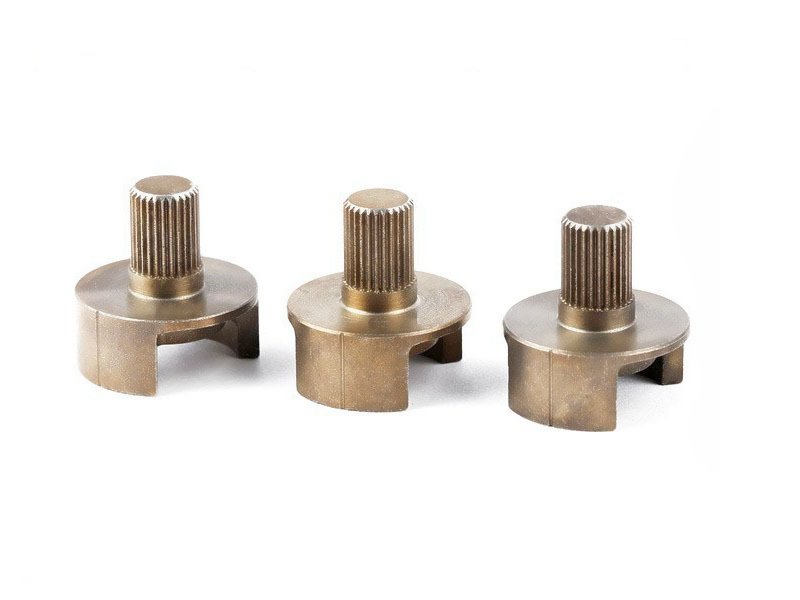Enhancing Structural Integrity: Powder Compression Molded Gear Components for Automotive
Introduction
In the automotive industry, gears are essential in power transmission, ensuring efficiency, durability, and vehicle performance. Achieving high structural integrity in gear components is crucial, as these parts must reliably withstand significant mechanical stresses, vibrations, and thermal fluctuations inherent in automotive operations.
One advanced manufacturing process meeting these stringent requirements is Powder Compression Molding (PCM). PCM offers precision, superior mechanical properties, and cost efficiency, making it an ideal choice for producing complex, structurally robust gear components specifically designed for the automotive sector.
Understanding the PCM Manufacturing Process
Powder Compression Molding involves compressing carefully prepared metal powders at high pressures (200–800 MPa) into precision-engineered molds. The initial step involves meticulous powder preparation, blending metal powders to achieve a homogeneous particle size distribution and consistent chemical composition, directly influencing final gear integrity and durability.
After powder preparation, the powder mixture is compacted under pressure to form a "green compact," a precisely shaped intermediate component. This green compact maintains dimensional accuracy with tolerances typically within ±0.05 mm, critical for automotive gears requiring exacting specifications for optimal performance.
Next, sintering occurs, a critical heat treatment process conducted between 1,100°C and 1,300°C in controlled atmospheres. During sintering, metal particles fuse together, significantly increasing density (typically achieving 95–99% of theoretical density), reducing porosity, and enhancing mechanical properties, essential for automotive gears under continuous stress.
Finally, the sintered gear components undergo post-processing operations, including precision machining, gear cutting, and surface finishing, ensuring exceptional accuracy and smooth integration into automotive transmission systems.
Typical PCM Materials for Automotive Gear Applications
Selecting the appropriate PCM materials significantly impacts automotive gear performance, reliability, and lifespan. Common materials used in automotive PCM gears include:
Low Alloy Steel (8620, 4140): Ideal for automotive gears due to high mechanical strength (tensile strengths ranging from 700–800 MPa after heat treatment), toughness, and cost-effectiveness. Grade 8620 is particularly favored for its excellent case-hardening properties, which are essential for gears requiring surface durability. Grade 4140 provides superior wear resistance, ideal for gears operating under high stress.
Stainless Steel (304, 316): Utilized when automotive gears require corrosion resistance. Grade 304 stainless steel offers excellent general corrosion resistance with moderate strength (~500 MPa). Grade 316 significantly improves chemical corrosion resistance, making it suitable for automotive gear applications exposed to aggressive environmental conditions.
Tool Steel (H13, D2, A2): Selected for automotive gears needing exceptional hardness and wear resistance. Grade H13 provides excellent toughness and thermal fatigue resistance, critical in high-temperature automotive environments. Grade D2 offers superior hardness (HRC 60+) and exceptional wear resistance, perfect for gears subjected to continuous friction. Grade A2 provides high dimensional stability, important for precise gear meshing.
Surface Treatments Enhancing Automotive Gear Performance
PCM-produced automotive gears often receive specialized surface treatments to enhance durability, reduce wear, and improve performance. Typical treatments include:
Electroplating (Nickel, Zinc): Offers excellent corrosion resistance and surface durability, ideal for gear components exposed to harsh automotive environments.
Black Oxide Coating: Provides improved corrosion resistance and reduces surface friction, beneficial in automotive gears operating under continuous rotational stress.
Phosphating: Enhances corrosion protection, improves lubrication retention, and reduces wear, significantly extending automotive gear lifespan.
Heat Treatment and Case Hardening: Improves surface hardness and wear resistance, crucial for automotive gear applications involving continuous friction and mechanical stress.
Advantages of PCM Gear Components in Automotive
PCM manufacturing provides significant advantages in automotive gear production, including:
Superior dimensional accuracy (±0.05 mm tolerances) ensuring precise gear meshing.
Enhanced structural integrity with high-density, low-porosity components.
Cost-efficient high-volume production capability.
Minimal material waste, supporting automotive sustainability goals.
Exceptional mechanical properties tailored for specific automotive performance needs.
Considerations in PCM Gear Manufacturing
Successful PCM gear manufacturing requires attention to specific considerations:
Powder quality and consistency are crucial for maintaining component integrity.
Precision mold design is capable of withstanding high-pressure compaction without distortion.
Accurate sintering process control is essential for achieving consistent density and mechanical properties.
Comprehensive post-processing operations to guarantee dimensional accuracy and superior surface finish.
Automotive Applications of PCM Gear Components
PCM-produced gears effectively support a wide range of automotive applications, including:
Transmission gears and assemblies.
Differential gears for torque distribution systems.
Engine timing gears and camshaft drives.
Steering systems and powertrain components.
Hybrid and electric vehicle gear systems, where precision and reliability are critical.
FAQs:
What is Powder Compression Molding, and why is it ideal for automotive gear production?
Which materials are commonly used in PCM automotive gear manufacturing?
How does Powder Compression Molding improve the durability of automotive gears?
What surface treatments are beneficial for PCM-produced automotive gear components?
What considerations are essential when using PCM technology for automotive gear manufacturing?

